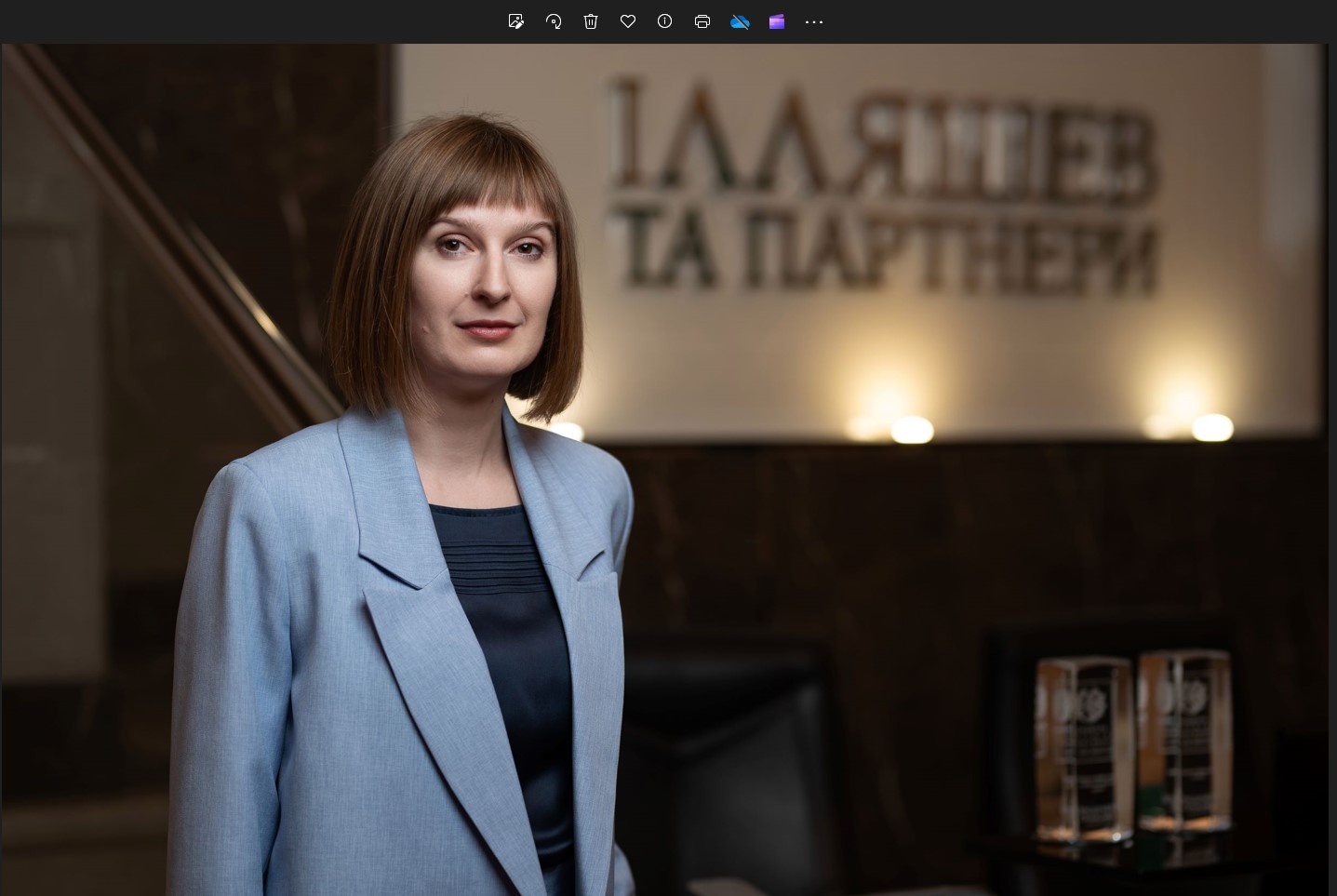Date of publication: 13 October 2025
Adapting businesses to modern requirements is a challenge faced by every Ukrainian company. Yurydychna Praktyka spoke with Valeriia Gudiy, Partner at Ilyashev & Partners Law Firm, about the changes currently affecting the labour market, which industries in the country are developing most dynamically, and how the introduction of European Standards is affecting labour relations.
— The labour market is currently transforming to meet the demands of the times. What questions do employers have, given the state of martial law in the country?
— Today, Ukrainian employers are no longer simply reacting to martial law – they are actively adapting their businesses and looking for ways to develop even in difficult conditions. Client requests have shifted from the settlement of employment contracts and the return of employees to production development, the recruitment of new employees and the introduction of flexible working arrangements.
Ilyashev & Partners Law Firm provides complex support for such processes: labour aspects of corporate transactions, personnel outsourcing, legal support for the transfer and relocation of employees.
The client list of Ilyashev & Partners Law Firm includes companies from the manufacturing, insurance, technology, defence, energy and other sectors.
When it comes to FMCG companies, they are interested in issues such as adapting employment contracts and introducing mechanisms for suspending and renewing contracts, occupational safety standards to ensure a gender-specific approach to protecting workers engaged in production activities, and staff relocation.
Given the current working conditions, many requests from both domestic and foreign companies are related to military registration: grounds for deferral from military mobilization, reservation of employees.
A separate area of work is requests from foreign humanitarian organizations, which currently have a very large staff, given their work throughout Ukraine. These are often international teams, which means a large number of foreign personnel and a decentralized regional presence, requiring compliance with labour and migration laws, obtaining the status of a foreign non-governmental organization, and maintaining military registration of employees.
— In Ukraine, a significant part of the economy is linked to the defence industry. What are the specific features of employment relations in the defence sector?
— Today, the defence industry is one of the most dynamic sectors of the Ukrainian economy. Due to the growing demand for military equipment and supplies, new defence enterprises are being actively created, including those with the participation of foreign capital.
For such companies, not only labour issues are becoming increasingly relevant, but also comprehensive legal support for starting a business: registering a company, obtaining licenses and permits, concluding contracts with personnel, ensuring confidentiality, complying with requirements and procedures for reserving employees, etc.
Ilyashev & Partners Law Firm supports such processes at all stages: from the creation of manufacturing companies to the reservation of critical enterprises’ employees. In particular, in 2025, we represented a critical infrastructure enterprise with over 700 employees, ensuring the preservation of its human resources during mobilization pressure.
Our experience allows clients entering the defence manufacturing market to operate legally, safely and strategically, which is critical for companies whose activities are directly related to national security.

— What challenges do international companies operating in Ukraine face?
— It is important for foreign investors to control their business in Ukraine without a permanent presence in the country. We advise foreigners on the registration of legal entities and representative offices in Ukraine, doing business, expanding production capacities, and relocating enterprises. Clients know that Ilyashev & Partners provides them with reliable legal support that guarantees business continuity even in difficult conditions.
We provide comprehensive legal support to foreign companies entering the Ukrainian market: from the registration process to resolving issues related to compliance with Ukrainian labour and migration laws regarding the employment of foreign executives, tax regimes, and obtaining licenses. Our experience helps companies implement practices that combine legal compliance, operational efficiency and reputation protection.
The difficulties faced by foreign businesses are typical for the current operating conditions in Ukraine: employee turnover, psychological stress on employees, mobilization, disruption of logistics chains, changes in the place of business, adaptation of employment contracts and personnel management to foreign executives and global practices and rules.
It is worth noting that after the National Bank eased currency restrictions, in particular allowing the transfer of dividends to non-residents up to EUR 1 million per month, investor interest has revived. Foreigners are currently most interested in businesses in the energy, logistics and agricultural sectors.
— What are the most common cases in labour dispute resolution at present?
— Labour disputes are becoming more multifaceted and complex. We work with our clients to develop individual strategies for optimizing labour relations, which reduce losses and minimize the risks of litigation. In fact, we understand our clients’ needs and do not initiate legal proceedings for the sake of process in cases where a consensus can be reached in the dispute. This tactic protects the client’s interests by avoiding increased legal costs and ensuring the desired outcome.
We work closely with businesses to not only resolve the current situation, but also to prevent risks in the future. Clients value our ability to combine legal expertise with an understanding of HR processes and business management.
More specifically, in recent years, there has been a tendency in labour disputes where employees abuse their rights and obligations, i.e. some manipulate through war, some take unfair advantage of remote working, some falsify documents and attempt to seize the employer’s property, while others are interested in dismissing a colleague and framing the employer. Many disputes concern the improper performance of job duties by employees. However, employers sometimes make mistakes in the process of dismissing employees or fail to take action despite clear mobbing of employees. Each situation is unique and requires an individual approach.

— What legislative changes should employers pay attention to in 2025?
— The most important thing is the expected adoption of the new Labour Code. We at the European Business Association (EBA) HR Committee Board are actively involved in its finalization so that our clients receive recommendations on how to work based on future changes.
In this context, it is worth mentioning the desire of businesses to digitize labour relations and document flow without the need to duplicate everything on paper, to establish flexibility in labour relations and to maintain a balance of interests in collective relations.
In terms of legislative changes, the issue of employees returning to work after the renewal of employment contracts will remain relevant, and for this purpose the legislator has provided for the obligation of each party to the employment contract to constantly (including during the suspension of the employment contract) ensure the possibility of communication and immediately inform the other party to the employment contract of any changes in their contact details, and from 14 March 2026, the suspension of an employment contract may be carried out at the initiative of one of the parties for a total period of no more than 90 calendar days during martial law (taking into account the terms of its extension), and employers need to be mindful of this.
— How do you assess the implementation of European labour law standards into Ukrainian legislation in general? What further steps does Ukraine need to take in terms of its commitments?
— This is a positive tendency that brings Ukrainian business closer to global practices. We help clients implement such standards in practice, including international companies and humanitarian organizations, ensuring legality, operational efficiency and a balance of interests between employers and employees.
We expect further integration of European standards into labour laws, strengthening the role of compliance, personal data protection and corporate ethics. Employers are increasingly realizing that effective human capital management is not only a legal issue but also part of a company’s reputation strategy.
Therefore, our team helps clients not only to resolve individual labour disputes, but also to build risk management systems, internal control policies, and programmes to prevent discrimination, mobbing, and other forms of employee rights violations.
In fact, the issue of employees’ psychological and emotional well-being is gradually becoming part of the legal responsibility of businesses. Employment lawyers are no longer limited to contracts or orders, they must help create a safe, predictable and fair working environment.
(The interview was conducted by Maksym Sysoenko, Yurydychna Praktyka)

